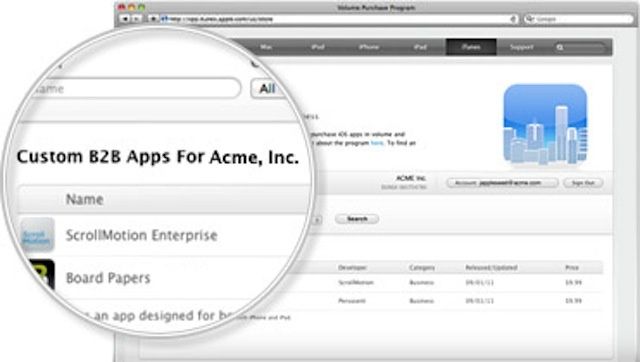According a study released earlier this month, Apple’s iOS is becoming the most popular platform for enterprise app development – with 53.2% of developers picking iOS for corporate app development compared to 37.4% of developers standing behind Android. RIM’s BlackBerry, the old guard of enterprise mobility, came in a distant fourth behind Windows Phone with only 2% of developers supporting it.
That’s great news for Apple and the iPhone and iPad in business and enterprise environments. Apple even makes enterprise distribution possible outside of the App Store. Mobile App Management (MAM) and enterprise app store solutions provide efficient and effective distribution and update methods for enterprise apps.
Business to business (B2B) apps and solutions, however, present a different kind of challenge – one for which Apple has a solution, even if it isn’t a perfect solution.
Business to business app development is almost certain to emerge as a major part of the app economy in the coming years. As more and more companies embrace mobile solutions and collaborate with their business partners or business customers, many of those interactions will be completed using devices like the iPhone and iPad. Even face-to-face interactions will be facilitated by mobile apps.
One recent example of this trend is the surge of pharmaceutical reps using iPads when meeting with doctors, which we reported last week. That interaction is essentially a business to business encounter that is facilitated by the iPad. Such interactions almost certainly revolve around custom apps that may be developed in-house or may be developed and customized by an outside app development firm or developed by market or industry partners.
Even electronic health record systems are a business to business solution and they are likely to be customized to the needs of a specific provider or practice.
An even better example is Appropos – a company that develops business to business catalog systems for retail distributors. The company’s robust solution, which includes custom catalog development, wholesale to retail ordering , basic mobile management, and content distribution, is a perfect example of business to business technologies.
The tricky situation with business to business apps is that they don’t easily fit into Apple’s traditional definition as commercial public apps designed for App Store sales/distribution or as enterprise apps developed, vetted, and distributed within a single company.
While it is possible to work around this using Apple’s existing enterprise app development program, it isn’t a seamless solution. Generally business customers need to be considered part of the developer’s enterprise or need their own enterprise developer program membership. Neither is exactly ideal.
Although Apple has kept fairly quiet about it, the company has developed a business to business app distribution option that leverages the existing Volume Purchase Program (VPP) for businesses. The system is pretty straight forward.
- Create B2B apps (and customize them to specific customer or partner organizations if desired or needed)
- Identify customers for the app and set a price point
- Upload the app using iTunes Connect (the same tool used for selling commercial apps)
- Customer organizations enroll in Apple’s VPP program and purchase the apps through iTunes Connect
- Customer organizations distribute the apps as they would any VPP purchase including using Apple Configurator, an enterprise app store, or a mobile management solution with app management capabilities
The system isn’t perfect and one fly in the ointment is that Apple’s typical App Store policies are still enforced – including App Store review.
While the system isn’t perfect and may not be appropriate for every business to business partnership, it is a step in the right direction. It shows that Apple acknowledges that business to business app sales are going to be a key part of enterprise and business app development and iOS use in the coming months and years.
Source: Apple
Image: Apple


